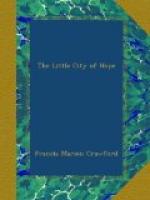Near the town they met the postman. As a rule Barbara got the mail when she went to market, and Overholt was not even going to ask the man if there were any letters for him. But the postman stopped him. There was one from his wife, and it was registered. He signed the little receipt for it, the man passed them on his rounds, and they slackened their pace as Overholt broke the seal.
He uttered a loud exclamation when he had glanced at the contents, and he stood still in the road. Newton stared at him in surprise.
“A thousand dollars!” he cried, overcome with amazement. “A thousand dollars! Oh, Helen, Helen—you’ve saved my life!”
He got to the side of the road and leaned against the fence, clutching the letter and the draft in his hand, and gazing into his son’s face, half crazy with delight.
“She’s saved it all for me, boy. Do you understand? Your mother has saved all her salary for the Motor, and here it is! Look at it, look at it! It’s success, it’s fame, it’s fortune for us all! Oh, if she were only here!”
Newton understood and rejoiced. He forgot his poor little attempt to help, and his own disappointment, and everything except the present glorious truth—not unadorned by the pleasant vision of the Christmas turkey, vast now, and smoking, and flanked by perfect towers of stiff cranberry jelly, ever so much better than mere liquid cranberry sauce; in the middle distance, behind the noble dish, a noble pyramid of ice-cream raised its height, and yellow cream-cakes rose beyond, like many little suns on the far horizon. In that first moment of delight there was almost a Christmas tree, and the mother’s face beside it; but that was too much; they faded, and the rest remained, no mean forecast of a jolly time.
“That’s perfectly grand!” Newton cried when he got his breath after his surprise at the announcement. “Besides, I told you so. What did I say? She wouldn’t let you give up the Motor! I knew she wouldn’t! Who’s right now, father? That’s something like what I call a mother! But then she always was!”
He was slightly incoherent, but that did not matter at all. Nothing mattered. In his young beatific vision he saw the bright wheel going round and round in a perfect storm of turkeys, and it was all his mother’s doing.
Overholt only half heard, for he had been reading the letter; the letter of a loving wife who believes in her husband and gives him all she has for his work, with every hope, every encouragement, and every blessing and Christmas wish.
“There’s no time to be lost!” Overholt said, repeating the words he had spoken in a very different mood and tone half an hour earlier. “I won’t walk on with you, my boy, for I must go back and get the wooden model for the foundry. They’ll do it for me now, fast enough! And I can pay what I owe at the bank, and there will be plenty left over for your Christmas too!”




